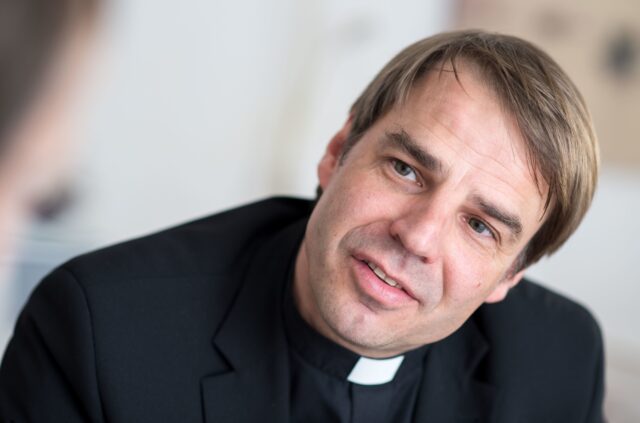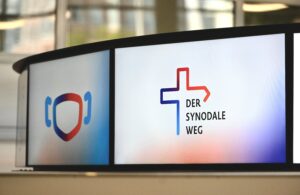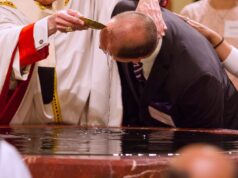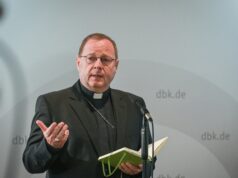
Authors of new German church guidelines for sexual identity classes at Catholic schools have declined to defend their text, after several bishops said it violated Catholic teaching and had been circulated without their consent.
“Created, Redeemed and Loved,” compiled by the German church’s Education Commission conference to address controversial “issues of sexual orientation and gender identity,” was published on Oct. 30 by the bishops’ conference, which said the brochure offered pedagogical and pastoral care for “queer individuals,” including pupils, teachers and parents.
“Successfully addressing issues of sexual orientation and gender identity, and not least the needs of queer individuals, is a challenge that many schools, including Catholic schools, have faced in recent years,” the bishops’ conference website said.
However, in a new sign of division in the German church, the 48-page document was bitterly criticized by Bishop Stefan Oster of Passau, who accused its authors of violating the “Christian understanding of humanity” and ignoring proposed modifications.
“It implicitly suggests the true goal of adolescent identity formation lies within the students themselves — and that pedagogical guidance is meant to provide a kind of sensitive midwifery service,” the bishop, a member of the Salesians of Don Bosco, said in a Nov. 14 statement.
“The very few remarks on church teaching are problematized to make clear they are fundamentally unsuitable … more likely to promote external control through outdated morality than to achieve self-determination through modern pedagogy.”

In a Nov. 21 statement, Germany’s Federal Association of Catholic Religious Education Teachers, or BKRG, and five other educational groups praised the text for strengthening “the visibility and recognition of the diversity of sexual identities in schools.”
However, Bishop Oster’s criticisms were endorsed Nov. 14 by Germany’s Archdiocese of Cologne, headed by Cardinal Rainer Maria Woelki, as well as by Bishop Rudolf Voderholzer of Regensburg.
Though members of the bishops’ Permanent Council requested changes to this text, it was published “in our name” almost unchanged, Bishop Voderholzer said, as reported by Germany’s Catholic KNA news agency Nov. 16.
“I don’t get the impression that we’re listening to each other and that we’re working together to achieve what we’ve been tasked with; instead, a political agenda is being pushed through at all costs,” he added.
The brochure covers issues debated during the German church’s 2019-2023 “Synodal Way” reform process, which also backed same-sex blessings and a re-examination of priestly celibacy.
It says the challenge of “living and learning together,” despite differences, extends to Germany’s 904 Catholic schools, which should be places of “the unconditional acceptance of each person” within “the framework of their individual development.”

Church “reservations” about “the lifestyles of many queer people” are increasingly questioned, the document added, and appear to “be out of touch with the lived reality and experiences of many people.”
“Exploring one’s own sexuality, love and partnership, and the social and moral dimensions of sexuality, is part of personality development and a core component of the school’s educational mission,” the brochure notes.
“A school that aims to foster personality development and identity formation of all students cannot ignore the situation of lesbian, gay, bisexual, transgender, intersex and non-binary youth, even if they are a minority. It must consider the situation and needs of these queer individuals.”
In his introduction, the Education Commission’s chairman, Bishop Heinrich Timmerevers of Dresden-Meissen, said commission members had developed the text in the light of “Synodal Way” discussions, adding that Catholic schools should foster “personal self-discovery and holistic development” in ways which excluded “any form of discrimination.”
However, Bishop Oster said the brochure had erred in viewing “humanity in its existing state as the measure of all things,” and in “constantly insinuating” that sexual orientations and gender identities among young people were “inherently natural” and that “the primary focus in the school context should therefore be on discovering these and fostering their successful development” as part of an “emotionally charged super-dogma.”
He added that the document treated official church teachings as not “helpful at all.”
“On issues such as sexual ethics among young people, we need to catch up significantly — but this cannot mean abandoning our own fundamental positions,” Bishop Oster said in his statement.
“No one responsible for this text seems to have considered that the message of faith, in its existential depth, can truly mean a life-changing offer of salvation. Do we, then, still believe what we believe?”
The controversy follows German church disputes over a handbook for same-sex blessings, published by the Bonn-based bishops’ conference in April, which brought a rebuke from the Vatican and has been rejected or ignored by many of the country’s 27 Catholic dioceses.
A spokesman for Bishop Timmerevers said he was not available to comment on disputes over the guidelines, while an Education Commission member, Professor Clauss Peter Sajak, told OSV News he was not entitled to “publicly intervene in debates between the bishops,” which were “currently quite lively.”
The German bishops’ conference spokesman, Matthias Kopp, declined to answer questions about the brochure’s legal status and reception at Catholic schools, and whether it reflected the position of the whole German church, and told OSV News they will “not make any further comment” on top of what was already said regarding the guidelines.
He also declined to say whether it had been discussed during a Nov. 12 Vatican visit by members of the German bishops’ conference, which included talks with Cardinal Victor Fernández, prefect of the Dicastery for Doctrine of the Faith.
Catholics make up around 26% of Germany’s 84.5 million inhabitants, although church participation has dropped sharply since 2019, with only 6.6% of Catholics currently attending Mass, according to July church data.










